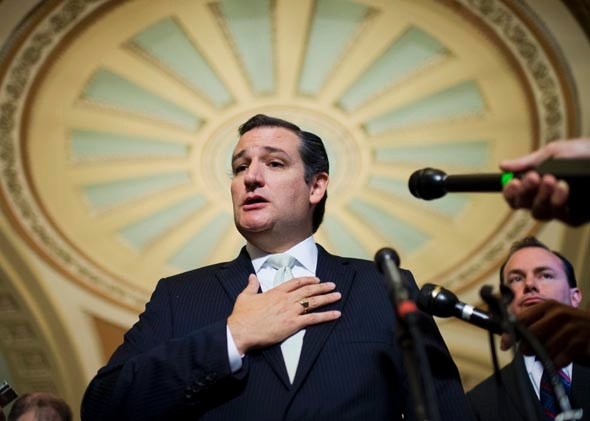Wait, I Thought We Were Fighting Over Obamacare?
Some Republicans think the budget battle is about blocking Obamacare. Others have moved on. What is the GOP fighting for?

Photo By Tom Williams/CQ Roll Call
Is the political gridlock in Washington over killing Obamacare or not? It’s hard to say anymore.
Take House Budget Committee Chairman Paul Ryan op-ed’s in Wednesday’s Wall Street Journal. Ryan’s article never mentioned Obamacare in his effort to press the president to negotiate. His argument’s presentation seemed to codify the recent strategic shift of the GOP from a fight it was losing on Obamacare to one over government spending, where it has better odds to get some kind of a result. This looked like a capitulation. Sen. Ted Cruz's senior aide was quick to point out the omission. Not long after, Ryan was on the radio saying that he didn't mean to suggest he'd given up on the Obamacare fight. When he referred to entitlements in his Journal op-ed, of course he meant Obamacare, too. In little more than a week, the president's health care plan has gone from the single reason for the budget showdown to an implied one.
Confusion was also on the menu across town where Heritage Action CEO Michael Needham spoke to reporters at a Christian Science Monitor breakfast. He said that Obamacare should not be tied to the debt limit fight. Rather, this leader of a powerful Tea Party interest group said the president’s health care law should be limited to the fight over a continuing resolution to end the government shutdown. What made this position confusing is that Heritage Action has been a key force in focusing the GOP budget strategy on the dismantlement of Obamacare. Their success has come from a clear message to grassroots activists: If your representative is serious about defunding Obamacare, he or she will go all the way. "Our core message about defunding Obamacare was if your elected official has told you he will do everything he can to stop Obamacare—and if he is pointing to the 40 votes that he took, none of which were attached to must-pass legislation—it is a valid question to ask why?" said Needham.
If you’re going to go all the way, why stop short of using the thing that gives you the most leverage? Nothing gives Republicans more sway with the president than the threat of breaching the debt limit. Polls indicate only about 20 percent of the public supports Obama’s demand that a debt limit be increased with no strings attached. Furthermore, the president’s repeated attempts to show that he was willing to negotiate in his Tuesday press conference were proof that his position of refusing to negotiate is weak. Republican Sen. Tom Coburn has recognized the debt limit as the ultimate leverage to force government to make hard choices. Why would those trying to beat back Obamacare stop short of using the stick that packs the biggest wallop?
One reason supporters of defunding Obamacare want it removed from the debt limit vote is that they don't trust the GOP’s leadership. Erick Erickson argued in RedState that the focus on the debt limit would lead to a "grand bargain," where taxes and entitlement provisions would be the big issues. With so much on the table, Obamacare would only be nibbled at, if touched at all.
Another reason to keep the Obamacare fight delinked from the debt limit fight is that it's not strong enough to take into that bigger battle. If economic chaos results from crossing the Oct. 17 debt limit deadline, the 72 percent of Americans who thought it was a bad idea to tie defunding Obamacare to our budget battles will grow higher. According to the Gallup poll, the GOP's favorable rating is now 28 percent, down 10 points from before the shutdown and the lowest Gallup has measured for either party since 1992. GOP leaders never liked this strategy and it’s not working politically, so those who support it are right to assume it would be the first casualty in any negotiation as high-stakes as the one over the debt limit.
By tying Obamacare to continued government funding, the debate can continue into its twilight stage. But if the Obamacare fight weren’t strong enough to survive the rocks of the debt limit fight, it could easily get traded away later when the government shutdown is resolved.
Imagine, for example, that the debt limit is raised temporarily in order to allow for fiscal talks. The president backed this idea in his Tuesday press conference—in partial fulfillment of the once fantastical exit strategy I wrote about a few days ago. That means the president would be engaged in negotiations, robbing Republicans of the useful stick that Obama was just sitting on the sidelines. (That critique—of a president refusing to even talk about his differences with those who disagree with him—was the most powerful talking point Republicans had going for them.) The president has also said he would talk about changes to Obamacare, which he might do as part of those entitlement talks Ryan was suggesting. Even if Obama isn’t serious, his offers will remove another GOP argument for repeal—namely, that Obama is inflexible.
Though the conservative Obamacare effort was weighed down by a lack of a clear end game, at least the mantra was clear—go big or go home. Going back on that forceful proposition seems like a tactical retreat unlikely to breed a new path to success.
Listen to the Slate Political Gabfest's Shutdown Special, Day 9:
